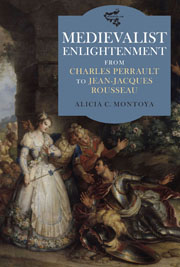Book contents
- Frontmatter
- Contents
- Dedication
- Acknowledgments
- Introduction
- I CONCEPTUALIZING THE MEDIEVAL
- 1 A Sense of the Past: Ancients, Moderns, and the Medieval
- 2 The Medievalist Rhetorics of Enlightenment
- II REIMAGINING THE MEDIEVAL
- III STUDYING THE MEDIEVAL
- Conclusion: Medievalism as an Alternative Modernity
- Bibliography
- Index
2 - The Medievalist Rhetorics of Enlightenment
from I - CONCEPTUALIZING THE MEDIEVAL
Published online by Cambridge University Press: 05 May 2013
- Frontmatter
- Contents
- Dedication
- Acknowledgments
- Introduction
- I CONCEPTUALIZING THE MEDIEVAL
- 1 A Sense of the Past: Ancients, Moderns, and the Medieval
- 2 The Medievalist Rhetorics of Enlightenment
- II REIMAGINING THE MEDIEVAL
- III STUDYING THE MEDIEVAL
- Conclusion: Medievalism as an Alternative Modernity
- Bibliography
- Index
Summary
If the medieval did not function in the early eighteenth century, as it does in our own time, as a historical or chronological category, then how exactly did it work? I argued in the previous chapter that in actual linguistic usage, the term moyen âge often served as a literary or linguistic term, as reflected also in the common use of the accompanying adjective barbare to describe the period. In this chapter, elaborating on this notion of the medieval as a non-historical concept, I argue that during the early eighteenth century, the medieval came to embody essentially a moral category or an epistemological anchoring-point for the authors whose works it inspired. It did this, to an important extent, by unsettling one of modernity's central metaphors: that of medieval darkness contrasted to modern-day light, equated finally with the Enlightenment itself.
The relation between the medieval and the modernity of the late seventeenth century was always a vexed one. Presenting itself most often as a conscious break with the medieval, modernity in fact drew on many medieval traditions in its own self-definition – as Perrault came to recognize in the last volume of his Parallèle. Modernity's self-definition was, right from the beginning, founded on the opposing images of historical light and darkness, equated respectively with the present-day age and the medieval past. French Renaissance literature borrowed the metaphor of modern light contrasted to a previous “dark age” (époque ténébreuse), as in Gargantua's famous letter, from Italian humanism, which had in turn borrowed it from medieval theology. Reversing the Biblical and Augustinian metaphor pitting Christian light against pagan darkness, Italian historians polemically presented pagan Antiquity instead as a source of light, and the Middle Ages as a period of darkness and ignorance.
- Type
- Chapter
- Information
- Medievalist EnlightenmentFrom Charles Perrault to Jean-Jacques Rousseau, pp. 43 - 68Publisher: Boydell & BrewerPrint publication year: 2013



